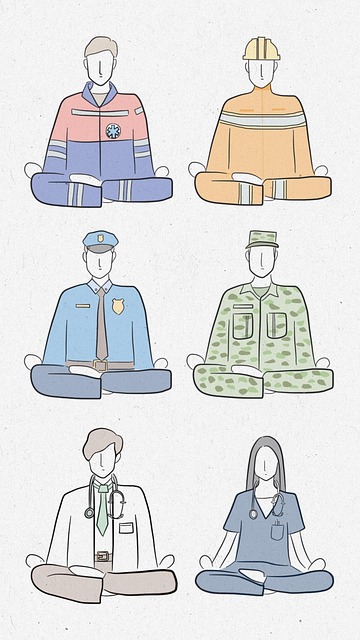Broomfield Crisis Counseling Therapy (BCCT) emphasizes the power of social skills training in mental health recovery, addressing common challenges faced by individuals with anxiety, depression, and PTSD. Their specialized programs focus on improving communication, building confidence, and strengthening inner resilience through group therapy and practical exercises. BCCT incorporates Social Skills Training, Mood Management, and Cultural Competency Training to reduce stigma and create supportive environments. Through interactive sessions and role-playing scenarios, clients gain essential tools for stress management, improved interactions, and fostering healthy relationships, ultimately enhancing mental well-being and life satisfaction.
Social skills training is a powerful tool in supporting individuals with mental health conditions, fostering better relationships, and enhancing overall well-being. This comprehensive guide explores how developing social skills can significantly impact recovery journeys. We delve into common challenges faced by those with mental illnesses, offering insights through the lens of Broomfield Crisis Counseling Therapy’s effective approach. Additionally, we provide practical strategies for training and share inspiring success stories, demonstrating the transformative potential of these programs.
- Understanding the Importance of Social Skills for Mental Health Recovery
- Identifying Challenges: Common Social Barriers in Individuals with Mental Illness
- Broomfield Crisis Counseling Therapy: An Overview of Their Approach
- Strategies for Effective Social Skills Training
- Real-Life Applications and Success Stories: The Impact of Social Skills Training
Understanding the Importance of Social Skills for Mental Health Recovery

In the journey towards mental health recovery, social skills training plays a pivotal role, often overlooked yet incredibly powerful. Many individuals struggling with conditions like anxiety, depression, or post-traumatic stress disorder (PTSD) face challenges in their interactions with others, which can hinder healing and personal growth. Broomfield Crisis Counseling Therapy recognizes this critical aspect of wellness and offers specialized programs tailored to enhance social skills, fostering a supportive environment for recovery.
By participating in these initiatives, clients not only learn effective communication strategies but also build confidence and inner strength. The Community Outreach Program Implementation at Broomfield focuses on teaching individuals how to navigate social situations with ease, reducing anxiety-inducing triggers. Through group therapy sessions and practical exercises, participants develop the tools needed to engage in meaningful connections, which is essential for combating feelings of isolation and promoting a positive sense of self.
Identifying Challenges: Common Social Barriers in Individuals with Mental Illness

Many individuals living with mental health conditions face significant challenges when it comes to interacting socially, often due to a combination of symptoms and stigma. These barriers can include difficulties in communication, such as expressing oneself clearly or understanding others’ perspectives, which may stem from anxiety or depression. Social isolation is another common struggle; people might retreat from social situations due to feelings of shame or low self-esteem related to their illness.
Moreover, cultural factors play a crucial role, especially in diverse communities. Healthcare providers and peers may hold varying attitudes towards mental health, impacting how individuals with these conditions are perceived and treated. Broomfield Crisis Counseling Therapy recognizes these challenges and emphasizes the importance of Social Skills Training and Mood Management as part of comprehensive care, alongside Cultural Competency Training for healthcare providers to foster understanding and supportive environments.
Broomfield Crisis Counseling Therapy: An Overview of Their Approach

Broomfield Crisis Counseling Therapy (BCCT) offers a unique and comprehensive approach to mental health support. Their methodology centers around empowering individuals with essential social skills, tailored to navigate life’s challenges effectively. BCCT recognizes that strong social connections and a robust self-care routine are vital for promoting emotional well-being and preventing depression.
Through interactive sessions, they guide clients in developing practical tools for managing stress, improving communication, and fostering healthy relationships. This holistic training enables individuals to build resilience, enhance their coping mechanisms, and create a supportive network, all of which contribute to improved mental health and overall life satisfaction.
Strategies for Effective Social Skills Training

Social Skills Training is a powerful tool for managing mental health conditions, offering individuals valuable strategies to navigate social interactions with confidence and ease. At Broomfield Crisis Counseling Therapy, we emphasize practical techniques that foster meaningful connections and promote well-being. One effective approach involves role-playing scenarios where clients can practice conversations, learn to interpret social cues, and develop appropriate responses, helping them build resilience in real-life situations.
Additionally, our programs encourage the cultivation of a Self-Care Routine Development for Better Mental Health, emphasizing the importance of self-awareness and emotional regulation. By integrating coping Skills Development techniques, such as mindfulness exercises and stress management strategies, individuals gain tools to manage symptoms, reduce the impact of Mental Illness Stigma Reduction Efforts, and enhance their overall quality of life.
Real-Life Applications and Success Stories: The Impact of Social Skills Training

Social Skills Training (SST) offers real-life applications that have proven successful in transforming lives, especially for individuals managing mental health conditions. Through role-playing and practice, participants learn to navigate social situations with more confidence, reducing anxiety and improving overall well-being. This practical approach empowers clients to apply learned skills in their daily lives, fostering better connections and enhancing their support networks.
Many success stories from Broomfield Crisis Counseling Therapy highlight the positive impact of SST. Clients have reported improved ability to communicate effectively, leading to better relationships with family, friends, and colleagues. The training also equips them with stress reduction methods, which are crucial for managing symptoms associated with conditions such as anxiety and depression. Mental Health Policy Analysis and Advocacy plays a significant role in ensuring that these services remain accessible, while Confidence Boosting techniques further empower individuals to lead fulfilling lives despite their challenges.
Social skills training is a powerful tool in the recovery journey for mental health conditions. By addressing common social barriers, as highlighted by Broomfield Crisis Counseling Therapy’s innovative approach, individuals can develop essential communication and interaction abilities. The strategies outlined in this article provide a comprehensive framework for effective training, leading to improved relationships, increased confidence, and enhanced overall well-being. Real-life success stories further underscore the profound impact of social skills training, demonstrating its potential to transform lives and foster supportive communities.














